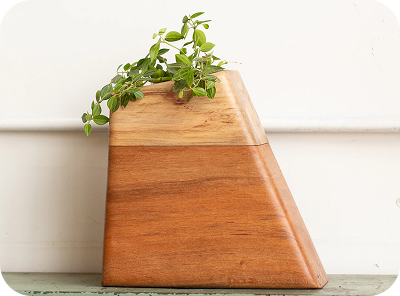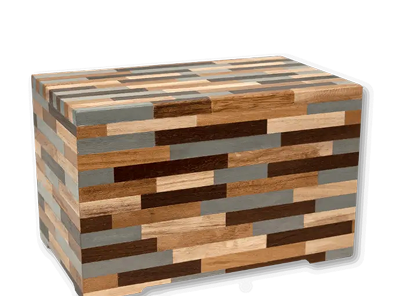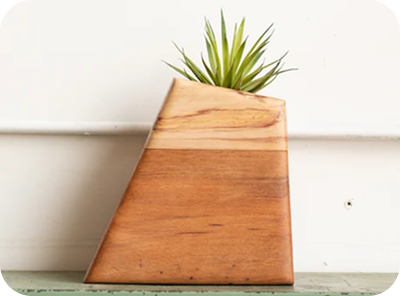Terramation offers a meaningful way to honor your loved one, creating a legacy that nurtures the world around us. This section answers your questions, helping you feel supported and informed as you explore this option.
Terramation is the process of transforming human remains into nutrient-rich soil through controlled natural decomposition, offering an environmentally friendly alternative to traditional burial and cremation.
How does Terramation work?
At Return Home, the body is placed in a custom-designed vessel with natural materials like straw, alfalfa, and sawdust. This environment promotes microbial activity that gently transforms the body into soil over approximately 60-90 days in two phases.
Is there anyone who is not eligible for Terramation?
Terramation is ruled out only in rare cases where the cause of death is a prion-related illness, such as Creutzfeldt-Jakob, or a highly infectious disease, like Ebola. Additionally, bodies that have been embalmed are not able to be terramated.
How long is the Terramation process?
Our process completely transforms a body into fertile, usable soil within 60 days. This includes 30 days in an individual vessel, and an additional 30 days for the resulting soil to cure.
How much compost is produced?
The Terramation process yields about 1.5 cubic yards of soil per body – 10-15 burlap bags full. The soil is nutrient-rich and fertile – a perfect amendment to gardens
What if I do not have enough outdoor space for that much soil?
We will return any excess soil to The Woodland, which is a privately protected piece of land that needs revitalization to help restart the cycle of life.
Where can I put terramated soil?
Terramated soil is exceptionally nutrient-rich and fertile. It is a perfect amendment to any natural area where you want to stimulate growth, from gardens to the forest. In California, the scattering or use of remains requires permission from the landowner. Keep in mind that if you want to scatter your remains on public land, you will need permission from the appropriate jurisdiction.
How does terramation benefit the environment?
Terramation reduces carbon emissions, conserves land, and enriches soil, making it a sustainable alternative to traditional practices.
How does terramation support soil health?
The nutrient-dense compost produced through terramation enriches the land, fostering plant growth and supporting conservation efforts.
How does terramation compare to cremation environmentally?
Terramation results in much lower emissions compared to cremation, which collectively releases around 360,000 metric tons of CO₂ annually in the U.S. alone—equivalent to the emissions from about 80,000 cars each year. By using a natural process that avoids burning, terramation significantly reduces the carbon footprint, making it a far gentler choice for the environment.
How does terramation compare to traditional burial?
Traditional burial practices in the U.S. consume over 20 million board feet of wood, 1.6 million tons of concrete, and 800,000 gallons of embalming fluid each year, much of which ends up in the soil. Terramation requires none of these resources, conserving land and preventing chemical seepage into the earth, making it a more sustainable option that minimizes environmental impact on a large scale.
How does terramation help reduce reliance on chemical preservatives?
Terramation removes the need for embalming, which typically involves chemicals like formaldehyde, phenol, and methanol. By choosing terramation, families avoid introducing these toxins into the environment. This gentle process allows for a natural return to the earth without the environmental toll of chemical preservatives, supporting a cleaner and healthier ecosystem.
Once terramation is complete, the soil created provides a way to honor your loved one by nurturing new life. Whether you keep the soil, use it in a memorial garden, or donate it to our Woodland, this section answers questions to help you make the choice that feels right.
What happens to the soil created through terramation?
Once terramation is complete, the soil is placed into breathable burlap bags and returned to your family. You may choose to keep all or part of the soil or donate any portion to Return Home’s Woodland, a protected space dedicated to land restoration and conservation.
Can the soil be used for growing plants or trees?
Yes, this nutrient-rich soil can support plant growth, making it ideal for memorial gardens, trees, or other green spaces. Many families find that using the soil in this way creates a living tribute, honoring their loved one’s memory while nurturing new life.
How much soil is typically produced from terramation?
The terramation process yields approximately 1-1.5 cubic yards, or typically about 250 pounds of soil.
Are there memorial options available through LifeSource?
Yes, we offer options to help create a meaningful tribute. Whether you use the soil for a memorial garden, plant a tree, or choose to donate it to The Woodland, we’re here to help you honor your loved one in a way that aligns with your wishes. We also have options for incorporating terramated remains into a variety of keepsakes.
We offer flexibility, transparency, and the ability to be involved throughout your loved one’s journey. From honoring your loved one with a laying-in ceremony to choosing meaningful ways to remember them afterward, this section answers questions about the available service options. Return Home welcomes all who wish to travel to Tacoma to be there with their person. LifeSource offers a variety of local service options, like laying-in ceremonies for those who plan local events.
What service options are available with Return Home?
We offer flexibility and choice throughout the terramation process. You can hold a laying-in ceremony at our facility, allowing family and friends to honor your loved one directly in the vessel they’ll be in during terramation. You’re also welcome to visit the vessel at any time during business hours, giving you a personal and uninterrupted space for grief and remembrance.
Can I personalize my loved one’s vessel?
Absolutely. We encourage families to decorate the vessel with items that hold special meaning, such as flowers, photos, or mementos. This personalization provides a deeply meaningful way to say goodbye and reflect your loved one’s essence through symbols of love and remembrance.
Can I be present for the beginning of the process?
Yes, our laying-in ceremony allows family and friends to gather and say goodbye before the terramation process begins. This can be a private, intimate time to share memories, offer words of love, and create a sense of closure. We handle all details with respect and transparency, so you feel connected throughout the experience.
What ongoing access do I have to my loved one's vessel during the process?
You’re invited to visit your loved one’s vessel at any point during business hours. Our open-door approach provides a comforting space for you to grieve at your own pace, knowing you can come back whenever you need.
What happens after the process?
Once terramation is complete, the soil created is returned to you. You have the option to receive all, part, or none of the soil, with any remaining portion eligible for donation to The Woodland, our dedicated space for land restoration and conservation. We also provide options for memorializing your loved one, from creating a memorial garden to planting a tree.
























